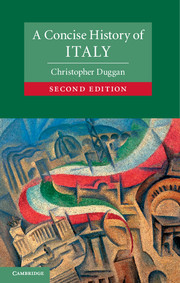Book contents
- Frontmatter
- Contents
- List of Illustrations
- List of Maps
- List of Tables
- Preface
- Chronology
- Introduction
- 1 The geographical determinants of disunity
- 2 Disunity and conflict: from the Romans to the Renaissance, 400–1494
- 3 Stagnation and reform, 1494–1789
- 4 The emergence of the national question, 1789–1849
- 5 Italy united
- 6 The liberal state and the social question, 1870–1900
- 7 Giolitti, the First World War, and the rise of Fascism
- 8 Fascism
- 9 The Republic
- Bibliographical essay
- Index
8 - Fascism
Published online by Cambridge University Press: 05 June 2014
- Frontmatter
- Contents
- List of Illustrations
- List of Maps
- List of Tables
- Preface
- Chronology
- Introduction
- 1 The geographical determinants of disunity
- 2 Disunity and conflict: from the Romans to the Renaissance, 400–1494
- 3 Stagnation and reform, 1494–1789
- 4 The emergence of the national question, 1789–1849
- 5 Italy united
- 6 The liberal state and the social question, 1870–1900
- 7 Giolitti, the First World War, and the rise of Fascism
- 8 Fascism
- 9 The Republic
- Bibliographical essay
- Index
Summary
Return to Order, 1922–1925
The March on Rome did not seem to most contemporaries to mark a watershed. No riots or demonstrations broke out; the routine of daily life continued uninterrupted; and the press reported the events as if they were just one more dramatic episode in Italy’s chaotic and violent post-war drama. The general mood was, if anything, one of relief – a sense that the confusion and uncertainty of the last few years was now over and normality about to return. Most observers anticipated that the squadristi would be absorbed into the system; and many believed that this would provide a badly needed injection of spiritual energy, that would strengthen the institutions and narrow the gap between ‘real’ and ‘political’ Italy. Politicians such as Giolitti were quietly dismissive of Mussolini, whose plebeian manner and evident insecurity encouraged them to think that he could be manipulated without difficulty, used, and then discarded when he had served their turn.
Mussolini was appointed prime minister in an essentially constitutional way, but in deference to the rank and file a ‘victory’ parade of squadristi was held through the streets of Rome in order to foster the illusion of a coup d’état. This schizophrenic start set the tone for the following two years. Mussolini had to alternate between appeasing the establishment (on whom he depended for continuance in office) and reassuring the provincial fascist bosses and their followers that he was still a subversive. However, for all their intemperance of language, it was not evident what the radical or ‘intransigent’ fascists wanted in place of the liberal regime. They knew what they loathed and what they aimed to destroy, but few of them had any constructive political ideas. Fascism was without a distinctive programme.
- Type
- Chapter
- Information
- A Concise History of Italy , pp. 207 - 241Publisher: Cambridge University PressPrint publication year: 2013
- 1
- Cited by



